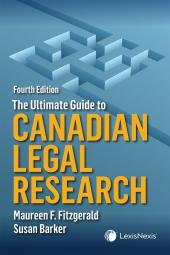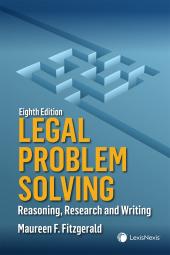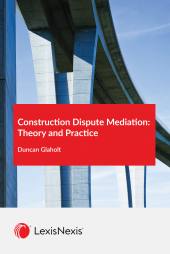Legal Problem Solving – Reasoning, Research and Writing, 8th Edition + The Ultimate Guide to Canadian Legal Research, 4th Edition
The author provides readers with practical commentary on effective legal research in the context of the complete legal problem solving process, and offer a structured framework to efficiently navigate paper-based resources and online databases.
One Year Subscription Only Terms
Subscribers receive the product(s) listed on the Order Form and any Updates made available during the annual subscription period. Shipping and handling fees are not included in the annual price.
Subscribers are advised of the number of Updates that were made to the particular publication the prior year. The number of Updates may vary due to developments in the law and other publishing issues, but subscribers may use this as a rough estimate of future shipments. Subscribers may call Customer Support at 800-833-9844 for additional information.
Subscribers may cancel this subscription by: calling Customer Support at 800-833-9844; emailing customer.support@lexisnexis.com; or returning the invoice marked 'CANCEL'.
If subscribers cancel within 30 days after the product is ordered or received and return the product at their expense, then they will receive a full credit of the price for the annual subscription.
If subscribers cancel between 31 and 60 days after the invoice date and return the product at their expense, then they will receive a 5/6th credit of the price for the annual subscription. No credit will be given for cancellations more than 60 days after the invoice date. To receive any credit, subscriber must return all product(s) shipped during the year at their expense within the applicable cancellation period listed above.
Product description
Click here for the student edition of Legal Problem Solving – Reasoning, Research and Writing, 8th Edition + The Ultimate Guide to Canadian Legal Research, 4th Edition.
This bestseller has been widely adopted by Canadian colleges and universities, and used by Canadian law schools for more than 20 years. The author provides readers with practical commentary on effective legal research in the context of the complete legal problem solving process, and offers a structured framework to efficiently navigate paper-based resources and online databases. This text introduced the well-recognized FILAC structure to legal writing adopted by professors and lawyers across Canada.
Bonus Companion Book
Purchasers of this book will also receive the updated fourth edition of The Ultimate Guide to Canadian Legal Research – a comprehensive checklist designed for Canadian legal research.
Features of this book
The book provides a step-by-step guide for identifying, researching and analyzing legal problems, as well as determining and communicating the relevant solution. Users of this reference book will discover:
- Advice on how to use print, paid online subscription services, and free online databases of caselaw and legislation
- Practical suggestions for tackling research problems and identifying and applying the law
- Direction on the skills necessary to analyze and solve legal research problems
- Helpful checklists, summaries and samples to facilitate learning
- An author team which brings a wealth of knowledge of legal research and problem solving
New in this edition
This updated version of Legal Problem Solving – Reasoning, Research and Writing contains the latest insight and tips on how to find the law and legal information, including
- Revised chart showing how to locate different resources in a law library
- Reviews new features in electronic legal databases such as Lexis Advance Quicklaw and WestlawNext Canada
- Contains updated illustrations of interface of large commercial legal information providers that have undergone changes since the last edition
- New sections about newly launched digital repository for legal scholarship named LawArXiv
- New section on emerging artificial intelligence and predictive analytics databases and emerging tools available such as Loom Analytics and Blue J Legal.
- Information about CanLii’s new feature: CanLii Docs
- Discusses research tools and supplements only available in the print version of the Canadian Encyclopedic Digest (CED)
- Lists new legal newspapers including The Lawyer’s Daily
- Updated section about when it is that statutes come into force
- Discusses the unofficial way to locate amendments to a statute
- Revised section on how to find statutes using Lexis Advance Quicklaw with helpful screen snapshots to familiarize the reader with the website layout and to assist the reader in their legal research
- Completely revised and updated appendix providing a comprehensive checklist on how to find and use commentaries using legal encyclopedias, textbooks and looseleafs, legal journals and periodicals, law dictionaries and books of words and phrases, forms and precedents, blogs and wikis and other providers.
- Appendix 7C on “Legislation on Government Websites” has been updated to contain new URL’s to find legislation on provincial and territorial government websites
- Revised note on how to find ‘rules of court’ using Lexis Advance Quicklaw
- Useful information about free online database: vLex Canada Open. Explains how to use the free source vLex Canada Open as well as the paid subscription version that includes additional resources.
- Discusses how to use Thomson Reuters’ The Canadian Abridgment to locate cases and digests
- Section on how to write a case citation has been largely re-written to explain the hierarchy of case citation and how to cite a case with a neutral citation
- Completely revised section and checklist of how to find cases using Lexis Advance Quicklaw
A great resource
This text provides a structured and effective framework to guide lawyers, law students, legal assistants, and paralegals through the legal problem solving process. In particular, Legal Problem Solving – Reasoning, Research and Writing would be an excellent acquisition for:
- Academic institutions providing a necessary and widely adopted text for law students at law schools as well as colleges offering paralegal and law clerk courses
- Law libraries providing comprehensive reference materials to users
- Law firms to provide to articling students and associates to help provide solutions to legal research and writing problems they may encounter
Table of contents
Chapter 1: The Legal Problem Solving Process
Chapter 2: Factual Analysis
Chapter 3: Issue Determination
Chapter 4: Introduction to Law and Legal Materials
Chapter 5: How to Find the Law and Legal Information
Chapter 6: How to Find Commentaries
Chapter 7: How to Find and Update Statutes
Chapter 8: How to Find and Update Regulations
Chapter 9: How to Find and Update Cases
Chapter 10: Introduction to Legal Analysis
Chapter 11: Legal Writing
Chapter 12: A Research Plan
Answers to Self-Test
Related products
-
 The Ultimate Guide to Canadian Legal Research, 4th EditionRelease date: June 27, 2019$30.00
The Ultimate Guide to Canadian Legal Research, 4th EditionRelease date: June 27, 2019$30.00 -
 Legal Problem Solving – Reasoning, Research and Writing, 8th Edition + The Ultimate Guide to Canadian Legal Research, 4th Edition – Student EditionRelease date: June 27, 2019$135.00
Legal Problem Solving – Reasoning, Research and Writing, 8th Edition + The Ultimate Guide to Canadian Legal Research, 4th Edition – Student EditionRelease date: June 27, 2019$135.00 -
New!Preorder
 Construction Dispute Mediation: Theory and PracticeNew!Release date: December 31, 2024$155.00
Construction Dispute Mediation: Theory and PracticeNew!Release date: December 31, 2024$155.00
 Lexis Nexis
Lexis Nexis 
